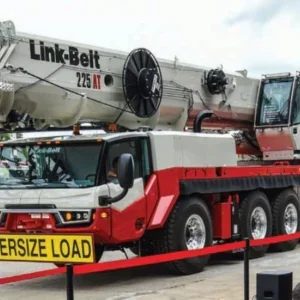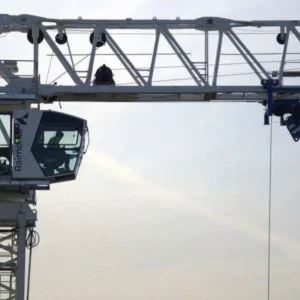Driving down costs is a primary focus for crane companies, because everything, except perhaps aerial work platforms, is getting more expensive. Danish rental company BMS takes a leading edge approach to environmental issues – not just to save the planet but also to save money.
There are social and corporate pressures pushing the green agenda. Members of the public and an increasing number of customers are demanding that all businesses account for how they treat the environment. In Denmark and other Scandinavian countries certain companies, such as steel mills and chemical plants, have to publish an environmental balance sheet as well as filing their financial report. This legal requirement, introduced in 1994, shows what impact a business’s operations have on the environment.
Though not among the enterprises legally required to do so, BMS took the initiative in 1998 and has voluntarily filed an environmental balance sheet every year since then, ‘to set the standard of best practice amongst rental companies,’ according to BMS managing director Søren Jansen. Since then it has introduced a series of other intitiatives in a bid to address the whole environment issue.
‘To pollute is no longer acceptable,’ says Jansen. ‘We can’t go on doing it and we must take our own responsibility for it. It costs a lot but it also saves a lot.’ An environmental engineer, Martin Dannevang, is employed to instigate schemes and promote efforts to reduce BMS’s impact on the environment, and Jansen claims that Dannevang is more than paying his salary in the savings he finds. In addition, each BMS depot has one person who is responsible for environmental issues and to ensure that the various measures are taken.
With 73 cranes, BMS is the largest mobile crane hire company in Scandinavia, Jansen claims, and with its 50th anniversary coming up in 2003 he says it is one of the oldest in the world. Its approach and attitudes, however, are modern.
In 1998 oil companies in Denmark started selling a low sulphur diesel fuel to reduce sulphur dioxide emissions. BMS converted completely to it in the same year, even though it was more expensive than standard diesel by 11øre ($0.0213) a litre which totals $42,600 when applied to the two million litres of diesel used annually by BMS.
Also since 1998 BMS has been fitting particle filtration systems to the exhausts of its truck mounted platform fleet. These remove between 95% and 98% of the harmful soot that is the most visible thing that people have to complain about exhaust emissions from diesel engined vehicles. Jansen goes as far as to claim that BMS was the first crane rental company in the world to fit such a system to a crane. A system with a GSM transmitter for monitoring exhaust emission is fitted to both the carrier and superstructure engines on a Demag AC 120 in the fleet. Crane manufacturer Demag’s warranty is unaffected by fitment of the system, Jansen says. The particle filtration system cost Dkr150,000 ($18,750) and, subject to successful test results, similar systems will be fitted to replace the standard exhausts on all new cranes that BMS buys. A new Liebherr LTM 1100/2, already with a Euro 3 engine, is to be fitted with particle filtration when it arrives in Copenhagen.
Another way of reducing emissions, by using less fuel (and therefore also saving money), is achieved through a programme of getting operators to check and maintain the correct tyre pressures on the fleet. As a result, in the 18 months to June this year, Jansen claims to have saved as much as 50,000 litres of diesel, or about 2.5% of the two million litres used annually.
A direct cost reduction was made from monitoring the system of waste disposal. Waste containers with a volume of 10m3 are used that previously were being paid for assuming that they would weigh a certain amount for the volume. BMS now has the containers weighed prior to removal which, at the Copenhagen branch site alone, has reduced the Dkr50,000 ($6,250) a year disposal cost to Dkr14,000 ($1,750).
Waste oil, coolant and batteries are stored separately prior to disposal. Oil is stored in a 1,000 litre container which, when full, is taken away for free by waste oil companies that would otherwise charge for removal, if the quantity was smaller. Certified waste disposal companies with ISO 1401 certificates are used for scrap batteries because the government gives money back on them. As for coolant, disposal currently has to be paid for but BMS is in contact with a Finnish company that claims to have a coolant that can be safely disposed of down the drain. Research is in progress to test development of the liquid for large diesel engine applications in cranes but it is expected to be some time before it is ready. A new vehicle and equipment washing bay at the Rødovre branch has a large tank so the water can be reused which saves money.
There is even money to be saved in safety. Towards the end of 1999 Jansen decided to start a safety campaign at BMS. A payoff came last year when the company got a Dkr1.3m ($162,500) bonus from its insurance company for the reduction in insurance claims following the introduction of the campaign.
Safety guidelines are already followed from Arbejdstilsynet (AT), Denmark’s OSHA / TüV equivalent. In addition to these BMS drew up its own safety instructions for each type of equipment. It is difficult to get people to follow such things so the safety campaign was started on 1 April 2000, using humour to get the message across, with a competition between BMS branches to win a green jersey for the best safety record. The depot that wins each quarter’s safety prize gets 10 dinners for employees and their partners.
Someone caught not wearing a safety helmet, for example, will be out of the competition for that quarter. If an operator is caught with outriggers not fully extended or with warning systems disabled, for example, then a written warning is given, followed by dismissal if there is a repeat. BMS has a full-time safety manager who makes unannounced visits and inspects sites. Credits are also given towards the quarterly safety record prize for reporting incidents that qualify as near misses.
A recently developed computer-based job planning software system saves money and improves customer service. Planning the job on computer establishes the optimum position for the crane and for delivery trucks to place their loads. On a contract to build a roof on the Danish national football stadium last year, this system reduced crane re-positioning from five times to three.
For the planning system three dimensional drawings are produced by BMS, using AutoCad software, from the two-dimensional ones supplied by the crane manufacturers. These drawings are then put into the program. Numerical data is added and stored in an Excel spreadsheet format.






